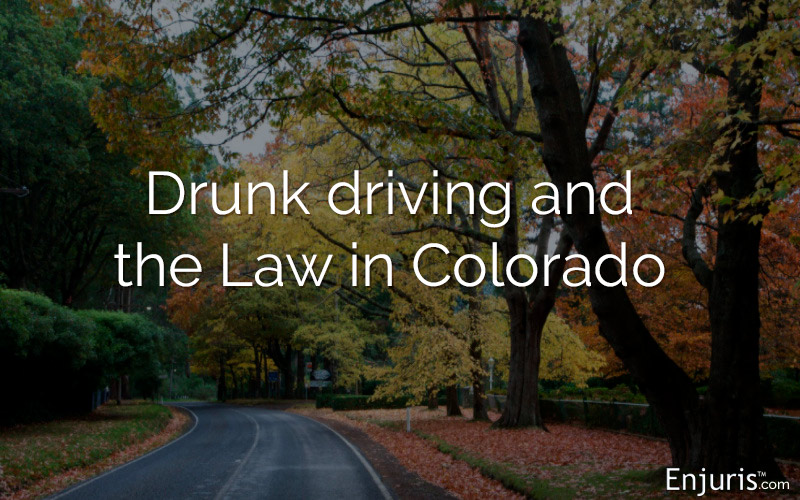
What you need to know about Colorado drunk driving accidents – plus how to win a legal case against a drunk driver
MADD has recognized a reduction in Colorado's drunk driving fatalities; however, a recent year shows there were still over 25,000 DUI arrests and more than 151 fatal crashes due to drunk driving in Colorado.
If your life has been devastated by a drunk driver, you have legal options.
You can file a personal injury lawsuit, or a wrongful death lawsuit against the drunk driver. This legal action is separate from the criminal case likely being pursued by the Colorado prosecutor against the driver.
Let's examine some of the common questions about DWI cases in Colorado, and how you can be compensated by bringing a case against the drunk driver.
What is a DWI in Colorado?
DWI stands for ‘driving while intoxicated,' and under Colorado law is defined as the driver having a blood alcohol content (BAC) above .08. The blood alcohol content reading is determined either by a breathalyzer or a blood test. Drivers who get behind the wheel intoxicated are much more likely to be in a car accident and injure others.
It is illegal in Colorado for anyone under 21 to possess or drink alcohol; the BAC limit for a driver under the age of 21 is .02.
It is a Class 2 misdemeanor for anyone to sell or serve alcohol to anyone under 21. If the person who caused the DWI accident is 21, whoever gave or sold alcohol to the driver could face other legal repercussions.
What happens when someone is suspected of DUI in Colorado?
According to the Colorado Department of Transportation, which is making DUI enforcement a priority, this is what happens with a DUI stop:
If the driver exhibit signs of impairment while operating a vehicle or during a traffic stop:
- He or she will be asked to perform a roadside sobriety test.
- If they are arrested for DUI, they will be handcuffed and driven to jail.
- He or she will be asked to provide a sample of blood, breath, saliva or urine to determine any alcohol or drug content.
- If they refuse the chemical test, they will lose their privilege to drive in Colorado for at least one year, regardless of whether they are convicted of an impaired driving offense.
- Their car may be impounded.
- He or she will be photographed and fingerprinted for a criminal record.
- He or she will be held in a jail cell or transported to an alcohol detoxification facility until they are sober.
If you spot a drunk driver, pull over and call 911 to give them the make model, color, license plate number, and location of the vehicle. You could be saving a life by doing this.
Colorado laws for drunk driving accident cases
MADD has compiled a great overview of drunk driving laws that Colorado has instituted, summarized here:
Vehicular Homicide
Statutes providing for penalties to be brought against a drunk driver who kills another person through the operation of a motor vehicle, either intentionally or negligently.
Sobriety Checkpoints
Sobriety checkpoints are an enforcement program that allows officers to stop all or predetermined vehicles to check for sobriety of the drivers.
Mandatory BAC Testing for Drivers Who Survive
Mandatory blood alcohol testing of all drivers involved in serious injury crashes who survive.
Mandatory BAC Test for Drivers Who are Killed
Statutes which create mandatory testing for all drivers killed in vehicle crashes.
Mandatory Alcohol Assessment/Treatment
Law that mandates all convicted DUI/DWI offenders undergo an assessment of alcohol abuse problems and participate in required treatment program.
Interlocks for First Time Convicted DUI Offenders
Statutes that require or highly incentivize the use of Interlocks for all first time convicted DUI offenders.
Ignition Interlocks
Statutes which allow for a judge or administrative agency to order a convicted drunk driver to operate a vehicle equipped with an ignition interlock device for a period of time following a conviction for drunk driving.
DUI Felony
Law that makes DUI/DWI a felony offense based on the number of prior convictions.
DUI Child Endangerment
Statutes which allow for additional penalties for a drunk driving conviction with a child passenger in a vehicle.
Dram Shop
Laws allowing liability of establishments arising out of the sale of alcohol to obviously intoxicated persons or minors who subsequently cause death or injury to third-parties as a result of alcohol-related crashes.
Administrative License Revocation
Administrative license revocation (ALR) is the removal of a DUI/DWI offender's driver's license at the time of an arrest upon the failure or refusal of a chemical test.
.08 Per Se Law
Law that makes it illegal to operate a motor vehicle at or above .08 Blood Alcohol Concentration.
Source: MADD.org
DWI accidents and legal options in Colorado
If you have been hit by a drunk driver and are injured, you should call the police immediately.
It also is important for you to contact an experienced Colorado personal injury lawyer as soon as you can. Note that under Colorado law, a person injured by a drunk driver in a car accident may not be able to sue for damages after three years has passed (also known as the statute of limitations).
If it is clear that the drunk driver caused your injuries (or caused the death of your loved one), you may be able to sue for:
- Medical bills
- Lost wages
- Pain and suffering
The sooner you contact an attorney after your injuries, the more likely you can sue for damages against the driver, and possibly other entities.
Dram shop laws in Colorado
The dram shop law in Colorado is a statute that can make a company or business liable for providing alcohol to someone under the age of 21. The dram shop law also can be used if the person was obviously intoxicated and the establishment served him anyway.
The establishment can be potentially held liable in a lawsuit for any injury, death or property damage in the resulting DWI accident.
Tweet this
The Colorado dram shop law differs from other personal injury cases; a DWI case imposes liability on a third party, and not just the driver that caused the crash. This of course doesn't mean that the convicted DWI driver will escape liability. The driver still can get sued. It's just that the dram shop law in Colorado establishes additional liability on a third party.
For example, let's say a customer at a bar has five drinks and is slurring their speech and falls over when he tries to walk. If the bar continues to serve that person and he causes an accident later, the dram shop law could come into play.
The injured person could sue the bar customer and also the bar. This would play out in a similar manner if the customer were a minor.
For example, a 2011 Colorado Springs DUI wreck left a 31 year old woman dead. A dram shop lawsuit was filed against the bar that served the 26-year-old drunk driver. The drunk driver received 10 years in prison, and the insurance companies for the driver and bar settled out of court for undisclosed amounts.
Dram shop law damages in Colorado
In Colorado, the injured person may be able to recover the following under the dram shop law:
- Medical costs
- Lost wages
- Property damage
- Pain and suffering
However, Colorado has a limit on how much you can recover in a dram shop case: $150,000.
Further, the statute of limitations for a dram shop case in Colorado is only one year. This can be a problem in these cases; sometimes it's unknown that dram shop liability is in play until the lawsuit has been filed against the drunk driver.
Social host liability laws in Colorado
Liability for a DWI accident also may fall on people who gave alcohol to minors or to those who were obviously intoxicated at a social gathering. This is known as ‘social host liability.'
The social host liability law in Colorado is different in that the person who allegedly provided the alcohol was not a licensed business. A social host is a person without a liquor license who provided alcohol in some type of social situation.
In Colorado, the social host is not liable for damages if a guest over 21 drinks and injures another party in a car accident. However, if the social host serves alcohol to anyone under 21, he can be held liable in a DWI accident.
The same is true if the social host provides some type of setting for minors to drink and a drunk driving accident results.
Caps on damages in Colorado
While you may sue a drunk driver for injuries or wrongful death, Colorado has established caps on non-economic damages, which include pain and suffering.
According to Colorado Statutes, the cap for pain, suffering and emotional upset for most cases is $250,000 (plus inflation).
This cap can be increased to $500,000 (plus inflation) by the court, IF there is ‘clear and convincing evidence' that this should happen. It rarely or seldom happens.
Cap exceptions in Colorado
One way a good personal injury attorney can skirt the cap is to get the jury to put your non-economic damages under ‘permanent physical impairment.' There usually are no caps for damages meted out for permanent physical impairment.
There also is no precise definition of ‘permanent physical impairment' under Colorado law, so attorneys have a lot of room to negotiate.
More resources
If you still are looking for DWI information and help, please check these resources:
- Have you or a loved one suffered due to a drunk driver? Find a drunk driving support group in your area through MADD.
- Help to fight underage drinking and driving by supporting SADD (Students Against Destructive Decisions).
- Learn about strategies to prevent drunk driving from the Centers for Disease Control and Prevention.
- The Colorado Department of Transportation maintains Colorado's fatal crash data broken out into several reports.
See our guide Choosing a personal injury attorney.

